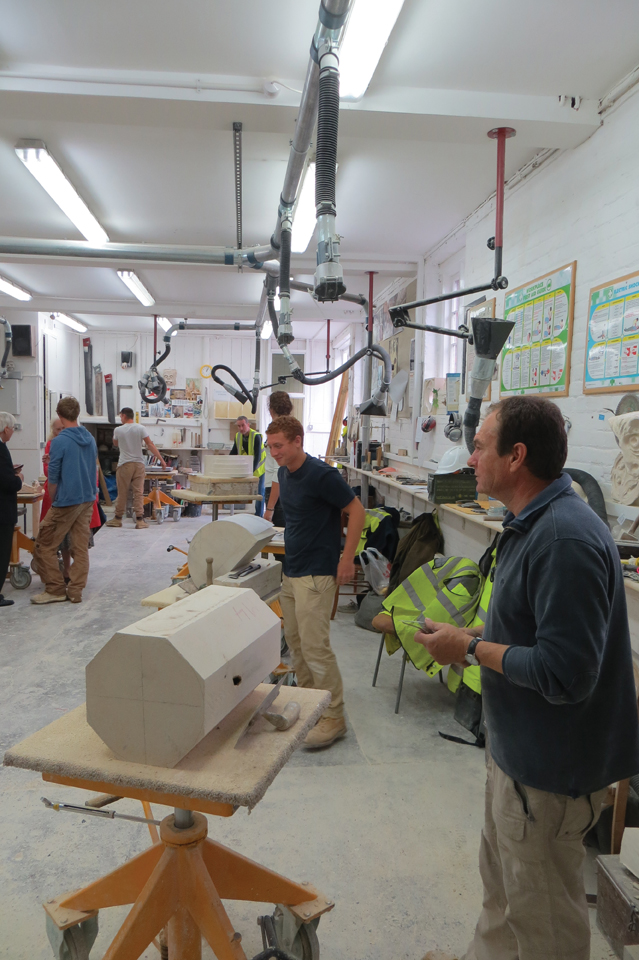Cathedral stonemasons are becoming a casualty of the coronavirus pandemic.
There are 10 cathedrals that have their own stonemasonry workshops in the Cathedral Workshop Fellowship, the original nine having been joined latterly by Chester after it re-opened its stonemasonry workshop. They all work together for training purposes.
Last year the Cathedral Workshop Fellowship opened its foundation degree course to trades people from outside the cathedrals and the 13 masons who started their courses this time last year included the first two students not employed by the cathedrals.
Cathedrals rely heavily on tourists, from overseas as well as from the UK, for their income and were already anticipating some loss of income as a result of Brexit, based on the fall of overseas visitors seen in 2019.
According to Visit Britain, representing the UK tourism industry, tourism from overseas this year now looks like seeing a decline of 59% in visits to 16.8million and 63% in spend to £10.6billion.
This represents a loss, compared with the pre-Covid forecast, of 25.3million people and £19.7billion, although Visit Britain does “stress that this central scenario is merely one possible outturn and involves several assumptions and simplifications due to the fast-moving and uncertain situation”.
With continued outbreaks of the virus around the world resulting in quarantine periods when visitors arrive in the UK, the loss of income could be worse than predicted.
UK cathedrals have had a significant fall in income as a result of having to close during lockdown. Although they were able to open again from 4 July, the number of visitors is still markedly down on what would normally be expected.
At Canterbury Cathedral, Mother Church of the worldwide Anglican Communion and seat of the Archbishop of Canterbury, the masonry department comprises 28 people.
A spokesperson for the Cathedral told NSS: “Prior to the pandemic, a degree of organisational change was planned anyway as the ‘Canterbury Journey’ neared its end.”
‘Canterbury Journey’ was a five-year project that included extensive restoration of the west towers, the nave roof and Christ Church Gate.
“It was always known that those departments that increased in size to undertake this work – including our stonemason team – would need to reduce as this huge project and period of substantial investment in the fabric of the estate neared completion.
“The unprecedented nature of the coronavirus crisis, however, and a loss in income to the Cathedral of over £3million during lockdown means that the need for organisational change is now even more pressing.
“Despite halting all but essential spending, as our main source of expenditure we must reduce staff costs across the Cathedral and, ultimately, the number of people who work with us.”
At York Minster there has already been some reduction in the number of masons in the 45-strong works department following the completion of the Great East Window restoration.
Second only to Canterbury in the Church of England, even the famous York Minster prep school, which has been providing choristers for the cathedral since the seventh century, is to close because of the “catastrophic loss of income” by York Minster caused by the coronavirus crisis.
At the start of this year, Frances Cambrook took over from Adrian Munns as Administrator of the Cathedral Workshops Fellowship. She had previously been the Academic Programme Manager and a major force in the development of the Fellowship as a training organisation.
She would like to develop Level 5 courses as a step up from the foundation degree, but for now she has been concentrating on getting the courses online so the current students can resume their work in September, having been suspended since March.
Although the courses were on hold, Frances says she was busier than usual. “I got on with strategic work, like getting grants.” Among them was an Historic England Coronavirus grant of £46,000 that is helping to get the courses on line.
Normally those who study with the Workshop Fellowship travel around to the different cathedral workshops in order to gain invaluable experience of working with different people and different stones. That is going to be severely curtailed this year.

